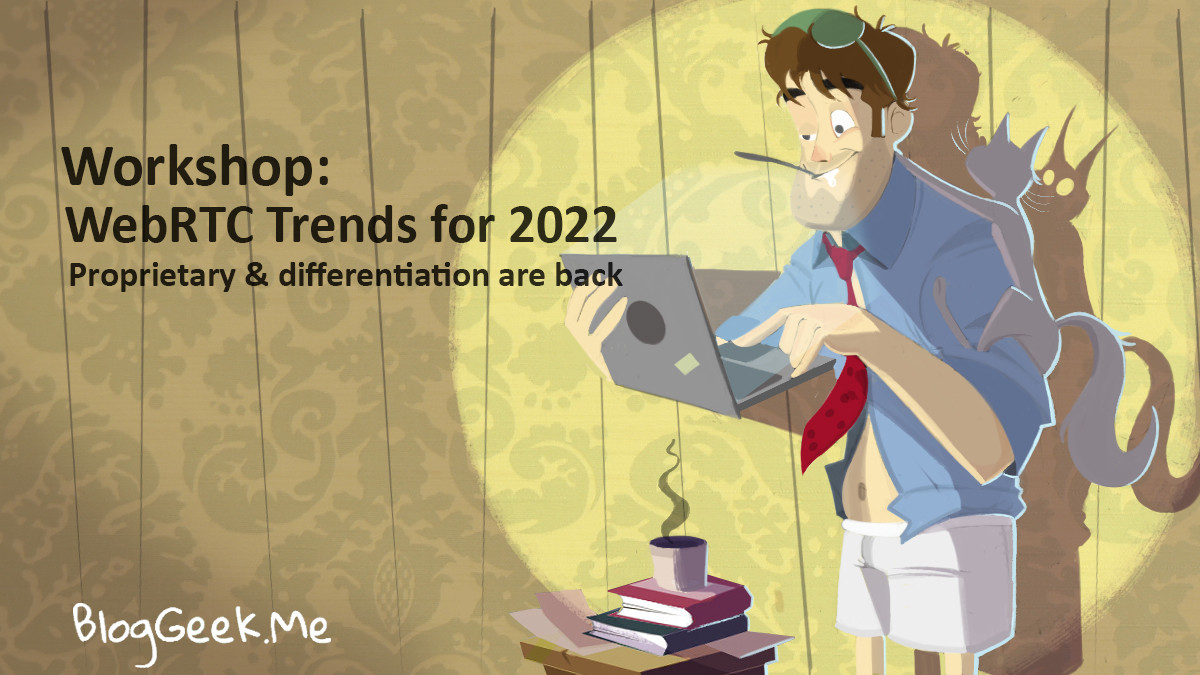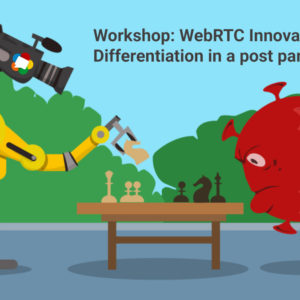NOTE: This workshop took place during February 2022 and is now available on demand in its recorded format.
A look at where R&D investments in WebRTC are headed in 2022
We've might have reached peak WebRTC, but we're seeing an increase in innovation and progress.
After two years of staying safe at home, remote working and learning, it is time to look at what has been accomplished and how is the next evolution of the WebRTC ecosystem and competition is shaping up.
This online workshop focuses on these trends and how they are affecting 2022 roadmaps.
The Gist
This is going to be an online workshop that will take place during January-February.
To keep you focused, it will be split into 3 sessions in 3 separate days.
Three 2-hour online sessions
Open mic
What will we cover?
Recorded
Additional resources and materials
Agenda
Session 1a: Introduction
There have been a lot going on in the past two years. The end result is a shift of how the WebRTC ecosystem now looks like. In this chapter of the workshop, we will introduce these changes and see where they lead us. This will serve as the baseline for the whole workshop.
Session 1b: Scale & Performance
WebRTC has improved significantly since the pandemic started. While we have been making progress, the road is still long. In this chapter, we will review what can be expected in 2022 in the domain of scale and performance.
Session 2a: Newtech
WebRTC is evolving and with it the introduction of new technologies. Some are here to "undermine" WebRTC while others are here to enrich and improve it. What are these technologies and what to expect of them in 2022?
Session 2b: Infrastructure
AWS is still the king for WebRTC hosting (as well as anything-hosting), but there seem to be some new innovative ways to look at infrastructure hosting these days. In this chapter, we will review the new approaches and the companies using them.
Session 3a: Use cases
We've seen many use cases flourish due to WebRTC. The ones that are making a note through this pandemic (that aren't boring talking heads or phone calls) are here, and they are... interesting.
Session 3b: Market forces
After going through all the trends, it is time to look at the market itself. Understand the forces and play, figure out how the WebRTC ecosystem is shifting, and from there, decide what our role in it is.
About me
Tsahi Levent-Levi is an Independent Analyst and Consultant for WebRTC.
Tsahi Levent-Levi has over 20 years of experience in the telecommunications, VoIP and 3G industry as an engineer, manager, marketer and CTO. Tsahi is an entrepreneur, independent analyst and consultant, assisting companies to form a bridge between technologies and business strategy in the domain of telecommunications.
Tsahi is the author and editor of BlogGeek.me, which focuses on the ecosystem and business opportunities around WebRTC. He is also a co-founder of Kranky Geek, a conference for WebRTC for developers, sponsored by industry leaders such as Google, Intel, TokBox, Twilio and IBM.
Tsahi was the co-founder and CEO of testRTC, a company providing self-service testing, monitoring and support solutions for WebRTC applications. testRTC was acquired by Spearline in 2021, with Tsahi shifting to a Head of Products role.
What are people saying
Here's what attendees of the WebRTC 2021 Trends workshop had to say about it:
"
I was looking for an update on the WebRTC market and technology trends, and the workshop provided exactly that.
The information was specific, very well organized, and delivered in an engaging and entertaining way.
The workshop was split into three sessions and gave me enough time to think about the material, do additional research, and prepare questions for the next session.
I left the workshop with a solid understanding of the WebRTC technology, even more importantly, of the many technology tradeoffs that the WebRTC community made along the way.
I use this knowledge in my everyday interactions with colleagues and customers, and think that the workshop would be beneficial for anyone in a Video Product Management or Architecture role, even for Solution Engineers who specialize in Video.
Stefan Karapetkov
Twilio
"
For me, the most useful part of the workshop was that I was able to interrupt and ask questions at any time, and have you provide relevant answers.
The workshop instilled some concepts and principles related to large group calls which will stay in my thoughts as our company works on future designs. That may be beneficial to our business.
I think the workshop could be beneficial to others, because it may save them some time and energy. The research you've done and the condensed way you present it is efficient in terms of time.
Cody Herzog
Teladoc Health





